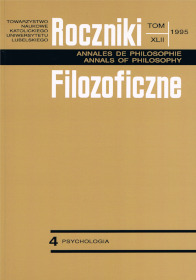Altruism vs. the Preference of Values Empirical Research
Abstract
The paper is a report on the empirical research dealing with the relationship between altruism and the preference of values. Altruism is taken to mean here an action for the sake of other people without expecting any external reward (Macaulay, Berkowitz). In the research presented here Karyłowski's typology has been used. Karyłowski distinguished two kinds of altruism: endocentric and exocentric.
Two methods have been used in the research: A-N questionnaire to measure the tension of altruism (Śliwak), Moral Endo-exocentric questionnaire KEEM which diagnoses the typologization of altruism (Karyłowski) and Rokeach Questionnaire to examine the hierarchy of values.
By means of these methods we sought to answer the following question: are there differences in the preferences of values between endo-exocentric altruists and the person of lower level of altruism? Are there differences in the preferences of values between endocentric and exocentric altruists? Is there a set of values which would be specific for any of the groups in question?
226 persons have been examined (53,1% women and 46,9% men) at the age of 23-33, the average is M=26,7. The persons under study were at least secondary school graduates.
The findings of the analyses are as follows:
1. The greatest differences in the preferences of values occur between endocentric altruists and the group of low level of altruism as well as between exocentric altruists and the group of low level of altruism. One notices certain convergence of results in the preferences of values of the endo- and exocentric groups. The values with the highest preference in both groups are the following: "salvation", "peace in the world", "national security", "loyalty" and "helpfulness". These groups put low value on "pleasure in life".
2. The endocentric altruists differ from the exocentric altruists as to their preference of the value "social recognition". This value is valued higher by endocentrics. The endocentric group stands out in relation to the remaining groups. It has a higher preference for the instrumental values like "obedience" and "loyalty".
3. The exocentric altruists are characterized by a more mature and responsible attitude to life, mature love and an ability to forgive others. We are entitled to such conclusions by the fact that they ranked most the following values: "wisdom", "mature love", "responsibility" and "forbearance".
Copyright (c) 1995 Roczniki Filozoficzne

This work is licensed under a Creative Commons Attribution-NonCommercial-NoDerivatives 4.0 International License.





